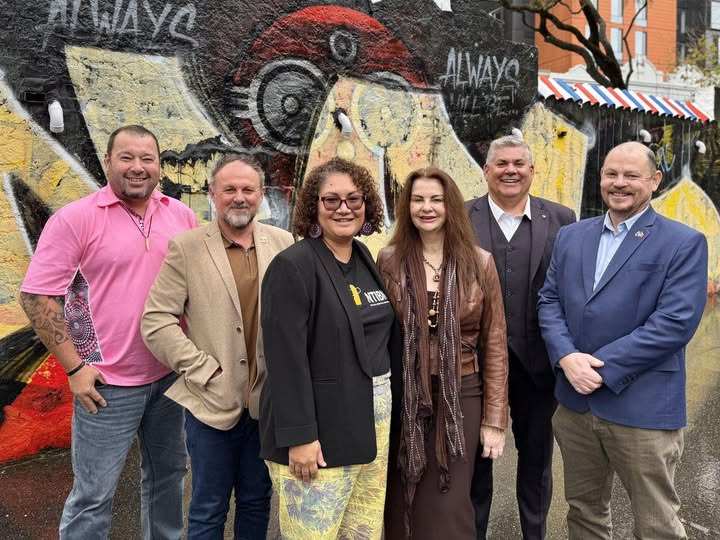Indigenous business chambers from across the country met in Redfern Wednesday to establish the National Indigenous Business Chambers Alliance (NIBCA).
The move came as Minister for Indigenous Australians Malarndirri McCarthy reiterated her support for Indigenous business chambers as voices for the growing First Nations economy.
Northern Territory Indigenous Business Network chief executive Naomi Anstess was elected Chair, with NSW Indigenous Chamber of Commerce head Deb Barwick as Deputy.
Attendees included NTIBN chair Raymond Pratt, Kinaway chair Trent Bickle, Noongar Chamber of Commerce and Industry chair Gordon Cole, NSW Indigenous Chamber of Commerce deputy chair Narelle Anderson, Murri Chamber of Commerce chair Adam Williams, and Adjunct Professor Kieran Hynes – chair of the Canberra Indigenous Business Network.
NIBCA’s brief is national and practical. It gives governments and corporates a single Indigenous-controlled partner for procurement. It will hold government policy, funding and rules to account. It will speak as the national voice for Indigenous business while keeping authority grounded in Country through the state, territory and regional chambers.
The Alliance will move immediately on two priorities.
First, an Indigenous-controlled national members database, verified through chambers, to give buyers and potential partners confidence they are engaging with genuine Aboriginal and Torres Strait Islander businesses.
Second, formalising the Alliance as a peak advocacy body to press for urgent reforms and faster delivery on the ground.
Wednesday’s launch aligns with Senator McCarthy’s address to Supply Nation’s Connect conference in Sydney on the same day.
The Minister thanked Indigenous businesses “for all you do to drive Indigenous business growth and create opportunities”, and said the Federal Government is “deeply committed to working in partnership with First Nations people to support economic empowerment and self-determination”.
She described the agenda as “unlocking opportunity and building prosperity”, noting recent First Nations roundtables and the new First Nations Economic Partnership as the framework to leverage land and Native Title, build skills, create jobs and back businesses.
On integrity, Senator McCarthy was explicit: “We must ensure that businesses benefitting are genuinely Indigenous owned and controlled… because integrity matters and because every contract awarded under the IPP should be a contract that builds real capability and long-term success.”
She confirmed work to tighten eligibility under the Indigenous Procurement Policy, lift Commonwealth purchasing targets and make it easier to report black-cladding, with reforms informed by audit recommendations.
A recent investigation by this publication found that UK birth and migration records contradict a CEO’s public claim to Aboriginal identity. Despite a formal family complaint—including a categorical statement from the man’s father that he is not Indigenous—the company remains listed as a “certified supplier” on Supply Nation’s directory.
Aboriginal leaders have also called for a seat at the national economic conversation. With Native Title determinations covering much of the continent, they argue Traditional Owner institutions should be present at the Treasurer’s Economic Roundtable this week where big decisions on infrastructure, energy and industry settings are made.
Ms Anstess says “this is a historic moment”.
“The NIBCA is the movement that will change the face of the conversations about the Blak economy and empowerment for our people,” she said.
“Born from the grass roots of our jurisdictions, we are the place-based, Blak-led solution, and Blak voice. We belong at the table alongside the Coalition of the Peaks to drive the Blak-led Aboriginal economic development narrative that will truly impact for mob. Our members are Blak Business. Blak Business is OUR business.
“Now is exactly the right time… we are at the precipice of change. Economic development can’t just be a new title for the same stuff. NIBCA is well placed in industry, in capability, in service delivery and in the lift-up of the Aboriginal economy to partner with the community-controlled and social services sectors.”
Leaders explained why chambers must be central to the next phase.
“We’re the leading Indigenous business body in Western Australia,” said Mr Cole.
“We have over 600 members. We foster trade, build capacity, advocate and create wealth—underpinned by our culture and community.”
From Victoria, Mr Bickle highlighted scale and partnership.
“Kinaway has 330-plus member businesses and around 300 corporate partners. Chambers change lives through economic prosperity. We’ll back anything that helps our members grow,” he said.
Mr Williams focused on representation that reflects Country.
“We can directly represent Aboriginal businesses and give them the advocacy they want”, he said, urging corporates to update RAP clauses so words “drive outcomes, not just intent”.
From the ACT, Adjunct Professor Hynes tied legitimacy to locality.
“We need local grounding with the local community, so we understand which Indigenous businesses are actually local—with local ownership and local engagement,” he said.
Ms Barwick underscored the evidence base.
“We’re the only Indigenous membership organisations focused on business. We know where the sector is strong, where it needs help and what’s changing. That’s the information government and industry need to buy better,” she said.
The Alliance’s immediate asks are clear.
From the Commonwealth: stable funding for chambers and the Alliance, a formal seat for NIBCA in IPP reform and macro-economic forums alongside the Coalition of Peaks, and transparent reporting on Indigenous procurement performance.
From corporates: active engagement with chambers and the Alliance, clear RAP procurement targets tied to executive accountability, and a commitment to purchase from genuine Aboriginal businesses.
With National Indigenous Business Chambers Alliance established, the indigenous business sector will now have a single, place-based, Indigenous-controlled voice at the national level.
The next step sits with governments and boardrooms: resource the NIBCA, seat it where rules are made, include Traditional Owners in the national conversation, and use chamber-verified businesses to buy with confidence.
Words by: Reece Harley – August 20, 2025 | https://tinyurl.com/The-IndigenousBusinessReview


